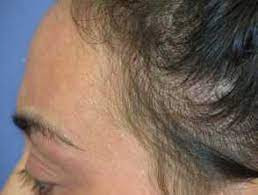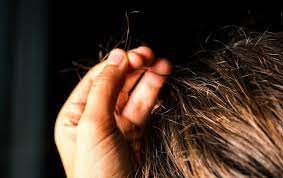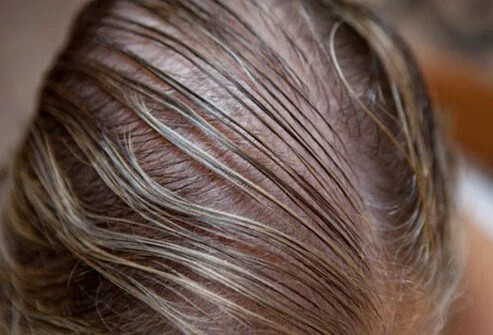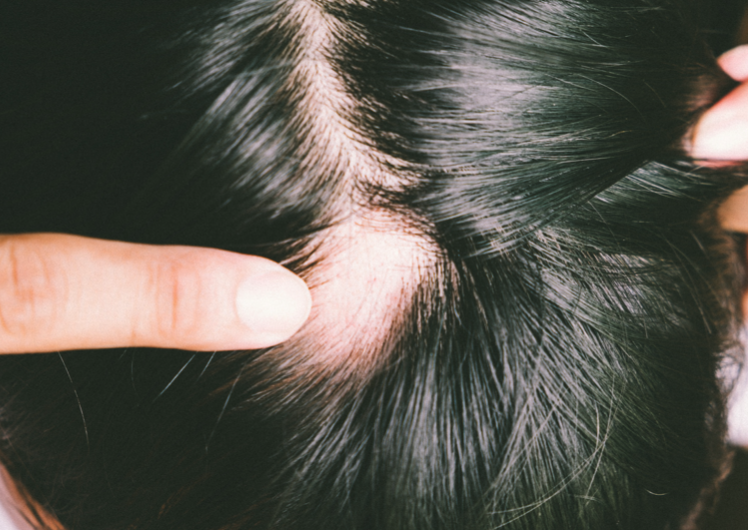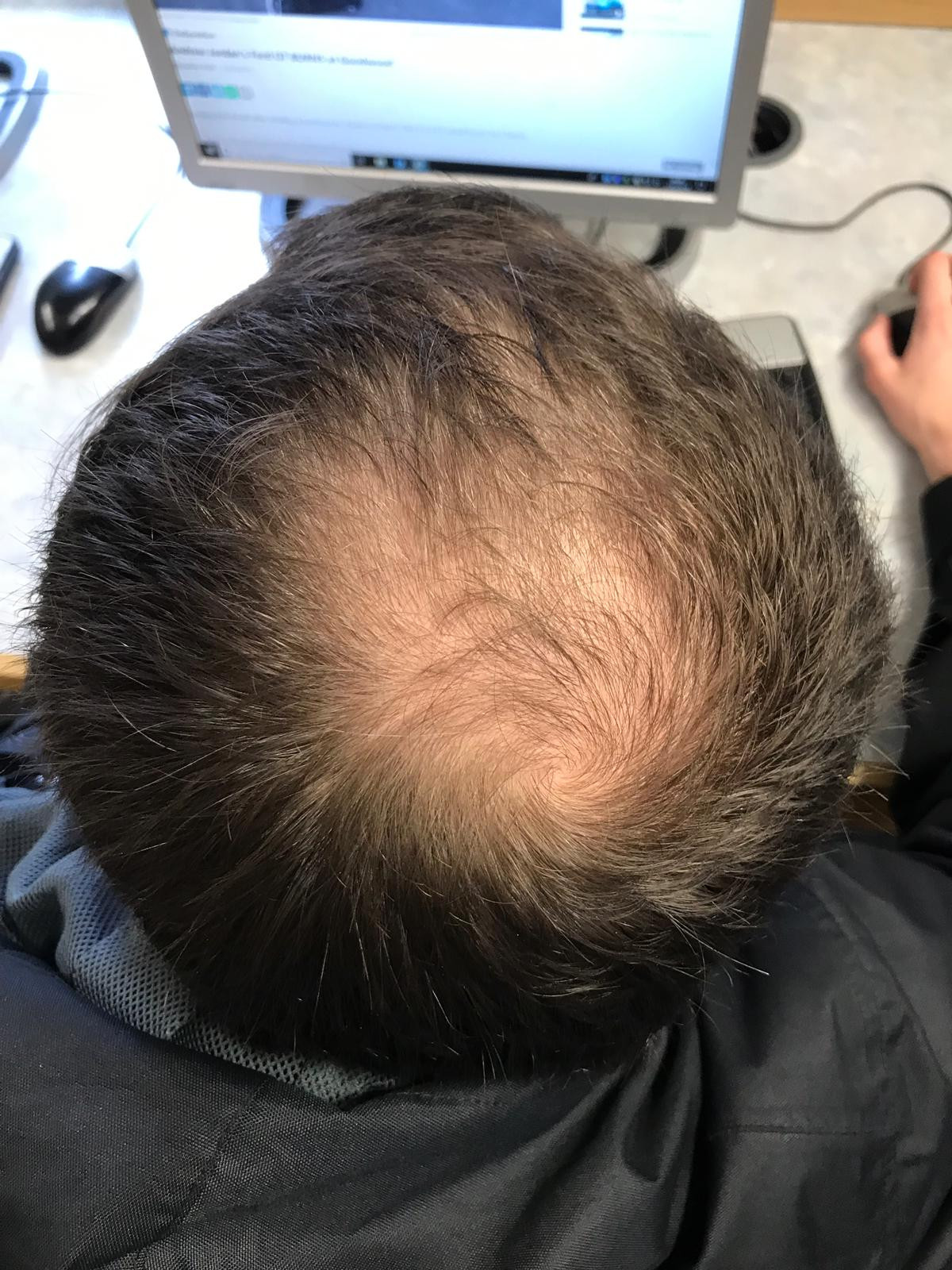Definisi
Telogen effluvium adalah salah satu bentuk kerontokan rambut yang ditandai dengan penipisan rambut atau peningkatan dari jumlah rambut yang rontok. Kondisi ini merupakan penyebab yang sering dari kerontokan rambut sementara. Biasanya, kondisi ini terjadi setelah stress, syok, atau kejadian traumatis. Telogen effluvium berbeda dengan kelainan rambut rontok yang disebut dengan alopesia areata. Pada telogen effluvium, kerontokan rambut sering bersifat sementara dan rambut biasanya akan tumbuh kembali. Seseorang dikatakan menderita telogen effluvium kronis jika ia sering mengalami periode rambut rontok selama lebih dari 6 bulan.
Penyebab
Siklus rambut umumnya terdiri dari 3 fase yaitu:
- Fase anagen atau pertumbuhan
- Fase katagen atau transisional
- Fase telogen atau istirahat
Telogen effluvium dihubungkan dengan fase telogen. Pada kulit kepala orang sehat yang normal, sekitar 85% folikel rambut aktif bertumbuh (rambut anagen) dan sekitar 15% sisanya berada pada fase istirahat (rambut telogen). Beberapa rambut juga mungkin berada dalam fase katagen. Folikel rambut biasanya menumbuhkan rambut anagen selama sekitar 4 tahun, kemudian istirahat selama sekitar 4 bulan. Rambut anagen baru akan mulai tumbuh di bawah rambut telogen dan mendorong rambut telogen untuk lepas (rontok). Oleh karena itu, normal untuk kehilangan sampai 100 helai rambut per hari pada sisir rambut, lantai, atau bantal, sebagai akibat dari siklus rambut yang normal.
Jika terdapat syok pada sistem rambut, sebanyak 70% rambut anagen dapat berubah menjadi telogen, sehingga rasio normal 85%-15% akan terbalik. Gangguan siklus rambut dapat disebabkan oleh beberapa faktor pencetus, seperti:
- Stress psikologis berat. Periode stress berkepanjangan dapat memicu telogen effluvium. Kerontokan rambut umumnya terjadi sekitar 3 bulan setelah kejadian yang stressful
- Diet yang buruk. Rambut membutuhkan nutrisi terutama protein, besi, vitamin B, dan zinc untuk bertumbuh. Jika terjadi kekurangan nutrisi tersebut maka akan mempengaruhi kualitas dan kuantitas rambut seseorang
- Penurunan berat badan secara tiba-tiba. Penurunan berat badan atau pengurangan kaloris kronis, seperti pada kondisi anoreksia nervosa, dapat menyebabkan kerontokan rambut
- Kehamilan dan melahirkan. Selama kehamilan, lebih banyak rambut yang berada pada fase anagen dengan waktu yang lebih lama. Perubahan hormonal yang tejradi 3 sampai 6 bulan setelah melahirkan dapat menyebabkan rambut untuk rontok. Hal ini disebut dengan telogen effluvium post-partum. Kondisi ini dapat sembuh setelah beberapa bulan atau berubah menjadi alopesia tipe wanita (female pattern alopecia)
- Menopause. Perubahan hormonal yang terjadi selama menopause juga dapat menyebabkan telogen effluvium
- Obat-obatan. Beberapa obat-obatan dapat menyebabkan kerontokan rambut
- Kondisi medis tertentu, seperti penyakit autoimun, kondisi yang mempengaruhi kelenjar tiroid (hiper atau hipotiroid), dan alopesia areata
- Pemberhentian pil kontrasepsi
- Operasi bedah. Terjadinya telogen effluvium setelah operasi bergantung dari prosedur operasinya, lamanya masa perawatan di rumah sakit, obat-obatan yang diberikan, dan status nutrisi keseluruhan
- Penyakit kulit yang mengenai kulit kepala, misalnya eritroderma
- Penyakit akut maupun kronis, terutama jika disertai dengan demam
- Kecelakaan
- Keracunan logam. Kontak dengan bahan kimia toksik pada logam dapat menyebabkan kerontokan rambut
- Perjalanan luar negeri yang menimbulkan jetlag
- Paparan sinar matahari berlebihan
Faktor Risiko
Telogen effluvium akut (mendadak) dapat terjadi pada semua kelompok usia dan pada kedua jenis kelamin. Namun, telogen effluvium kronis (jangka panjang) tanpa penyebab yang jelas lebih sering terjadi pada wanita sehat yang berusia 30 sampai 60 tahun. Pada kondisi ini, terjadi gangguan dari siklus rambut yang tidak dapat dijelaskan pencetusnya.
Gejala
Gejala utama telogen effluvium adalah peningkatan mendadak jumlah rambut yang rontok, biasanya beberapa bulan setelah kejadian pencetus. Seseorang dapat menyadari bahwa lebih banyak rambut yang rontok daripada biasanya saat mencuci atau menyisir rambut. Anda juga mungkin mendapati lebih banyak rambut yang rontok di bantal. Biasanya kerontokan rambut terjadi pada puncak kepala. Penderita telogen effluvium tidak kehilangan seluruh rambutnya, meskipun rambut bisa sampai tampak tipis.
Pada kebanyakan kasus, kehilangan rambut tidak lebih dari 50%. Biasanya telogen effluvium berlangsung sampai sekitar 6 bulan, keucali pada kasus telogen effluvium kronis, yang dapat berlangsung lebih lama.
Diagnosa
Untuk mendiagnosa telogen effluvium, dokter akan memeriksa rambut yang rontok. Beberapa pemeriksaan dapat digunakan untuk mendiganosa telogen effluvium yaitu:
- Bentuk, diameter, dan panjang rambut yang rontok dapat mengarahkan ke kondisi telogen effluvium dan membantu untuk membedakan antara kondisi ini dengan alopesia. Pada telogen effluvium, rambtu yang rontok memliki akar yang berbentuk khas, yang disebut dengan club hair. Hal ini dapat membedakan dengan anagen effluvium (misalnya pada alopesia areata) dimana bentuk rambutnya berbeda.
- Tes tarik rambuh untuk melihat seberapa banyak rambut yang rontok saat ditarik
- Tes cuci rambut dimana jumlah rambut yang rontok saat cuci rambut dihitung
- Pemeriksaan darah dapat berguna untuk mencari penyebab rambut rontok. Pemeriksaan ini juga dapat membantu mendiganosa adanya kekurangan zat besi atau gangguan hormon tiroid
Dokter juga akan melihat indikator dari kesehatan rambut seperti kesehatan kulit kepala, adanya bercak kebotakan, atau penipisan rambut yang general.
Tata Laksana
Tidak ada pengobatan terapi spesifik untuk telogen effluvium, namun perubahan gaya hidup dan pola diet dapat efektif untuk memulai pertumbuhan rambut kembali. Terapi telogen effluvium secara umum bergantung pada penyebab terjadinya kerontokan rambut. Ketika pencetusnya sudah ditemukan dan diatasi, siklus rambut biasanya akan kembali normal dan rambut akan tumbuh kembali.
Pilihan terapi untuk telogen effluvium meliputi:
- Memperbaiki kekurangan nutrisi melalui pola diet yang sehat
- Penggantian rambut non bedah
- Terapi pengganti hormon untuk orang yang mengalami menopause
- Konseling untuk mengatasi stress atau cemas
Selain itu, terapi kimi atau terapi panas yang dapat merusak rambut harus dihindari, termasuk styling rambut, curling atau perming rambut.
Diet yang disarankan untuk telogen effluvium adalah:
- Diet kaya protein. Protein merupakan bahan dasar yang penting untuk pertumbuhan rambut. Pastikan diet Anda meliputi makanan yang kaya protein, seperti daging, telur, ikan, kacang-kacangan, dan biji-bijian. Asam amino lisin terutama penting untuk pertumbuhan rambut
- Diet kaya zat besi. Kekurangan zat besi dihubungkan dengan terjadinya telogen effluvium. Perubahan pola diet menjadi diet kaya zat besi dapat membantu mengatasi kerontokan rambut. Contoh makanan kaya zat besi adalah daging merah, hati, sayuran berdaun hijau, dan kacang-kacangan
- Suplementasi dapat dipertimbangkan untuk jangka waktu pendek sembari menunggu perkembangan status nutrisi
Komplikasi
Pada telogen effluvium, umumnya rambut akan tumbuh kembali dalam 3 sampai 6 bulan setelah pencetusnya diatasi. Terkadang, jumlah kerontokan berkurang namun tidak berhenti sepenuhnya.
Namun, episode telogen effluvium akut yang berulang terkadang dapat berubah menjadi female pattern hair loss
Pencegahan
Cara satu-satunya untuk mencegah telogen effluvium adalah dengan mencegah faktor pencetusnya, yaitu dengan:
- Manajemen stress
- Pola diet sehat yang kaya zinc, vitamin D, protein, dan asam lemak
- Merawat rambut. Folikel rambut paling lemah saat basah, sehingga lebih direkomendasikan untuk menyisir rambut setelah rambut kering
Kapan Harus ke Dokter?
Jika Anda mengalami kerontokan rambut yang cenderung bertambah parah, maka sebaiknya Anda berkonsultasi dengan dokter. Dokter akan membantu mencari penyebab kerontokan rambut dan mencari rencana terapi yang paling tepat untuk Anda.
Mau tahu informasi seputar penyakit lainnya? Cek di sini, ya!
- dr Anita Larasati Priyono
Telogen effluvium: Symptoms, treatment, and recovery. Medicalnewstoday.com. (2022). Retrieved 1 June 2022, from https://www.medicalnewstoday.com/articles/321590
Telogen effluvium (hair shedding) | DermNet NZ. Dermnetnz.org. (2022). Retrieved 1 June 2022, from https://dermnetnz.org/topics/telogen-effluvium
How To Prevent Telogen Effluvium: 3 Tips From Experts. WebMD. (2022). Retrieved 1 June 2022, from https://www.webmd.com/connect-to-care/hair-loss/how-to-prevent-telogen-effluvium-according-to-experts
Telogen Effluvium: Causes, Regrowth, and More. Healthline. (2022). Retrieved 1 June 2022, from https://www.healthline.com/health/telogen-effluvium#outlook

